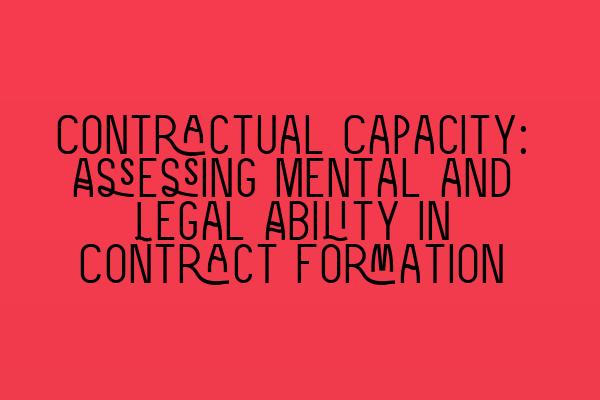Contractual Capacity: Assessing Mental and Legal Ability in Contract Formation
When entering into a contract, the parties involved must possess the necessary mental and legal abilities to understand and be bound by its terms. This requirement is known as contractual capacity, and it ensures that contracts are entered into freely and with informed consent. In this article, we will explore the concept of contractual capacity and discuss its importance in contract formation.
What is Contractual Capacity?
Contractual capacity refers to the legal and mental ability of a person to enter into a contract. It is a fundamental principle of contract law that a contract is only valid if all parties have the capacity to understand and fulfill their contractual obligations.
In order to have contractual capacity, a person must meet two key requirements:
- Legal Capacity: This refers to a person’s legal status or age. Minors, for example, may lack legal capacity as they are deemed to lack the legal ability to fully understand the consequences of their actions. Some individuals with mental disabilities may also lack legal capacity, depending on the severity of their condition.
- Mental Capacity: This refers to a person’s mental ability to understand the nature and consequences of the contract. It involves having the cognitive ability to comprehend the terms of the contract and make informed decisions.
Legal Capacity
Legal capacity is primarily determined by a person’s age and legal status.
Minors, typically those under the age of 18, are generally not considered to have the legal capacity to enter into contracts. This is because the law recognizes that minors may lack the maturity and judgment necessary to understand the consequences of their actions. However, there are certain exceptions to this rule, such as contracts for necessities (e.g., food, clothing, shelter) or contracts approved by a court.
In addition to age, individuals who have been declared mentally incapacitated by a court may also lack legal capacity. This could include individuals with severe mental illnesses or disabilities that impair their ability to understand the terms of a contract.
It is crucial for parties to a contract to ensure that all parties involved have the necessary legal capacity. Failing to do so may result in the contract being voidable, which means that one party may choose to void the contract due to the other party’s lack of capacity.
Mental Capacity
Mental capacity refers to a person’s cognitive ability to understand and make decisions about a contract.
In order to have mental capacity, a person must have the ability to:
- Understand the terms of the contract
- Comprehend the consequences of entering into the contract
- Appreciate the potential risks and benefits involved
- Make a voluntary decision to enter into the contract
There are situations where individuals may lack mental capacity, such as those with severe cognitive impairments, mental illnesses, or intoxication. In such cases, the person may not fully understand the terms and consequences of the contract, thus raising concerns about their ability to give informed consent.
To determine mental capacity, it is important to consider factors such as:
- The person’s ability to communicate their understanding of the contract
- The consistency of their decision-making capacity over time
- Any medical or professional assessments of their mental capacity
Importance of Contractual Capacity
Contractual capacity is of utmost importance in contract formation as it ensures that contracts are entered into voluntarily, with informed consent, and by parties who are capable of fulfilling their obligations.
If one party lacks the necessary contractual capacity, the contract may be voidable. This means that the party without capacity may choose to void the contract, leaving the other party without any recourse.
Additionally, a contract entered into with a party who lacks capacity may be considered void from the outset, rendering it unenforceable in court. This can result in significant legal and financial consequences for all parties involved.
It is therefore crucial for solicitors and contract law practitioners to assess each party’s contractual capacity before entering into a contract. This helps protect the interests of their clients and ensures that all parties have a clear understanding of their rights and obligations.
Conclusion
Contractual capacity is an essential concept in contract law that determines the validity and enforceability of a contract. Parties must have both legal and mental capacity to understand and fulfill their obligations. Failing to assess and ensure contractual capacity can lead to voidable or unenforceable contracts.
As a solicitor or legal professional, it is imperative to carefully evaluate the contractual capacity of all parties involved in a contract. This protects the interests of your clients and helps maintain the integrity of the contract.
For more resources on contract law and preparation for SQE exams, feel free to refer to the following articles:
